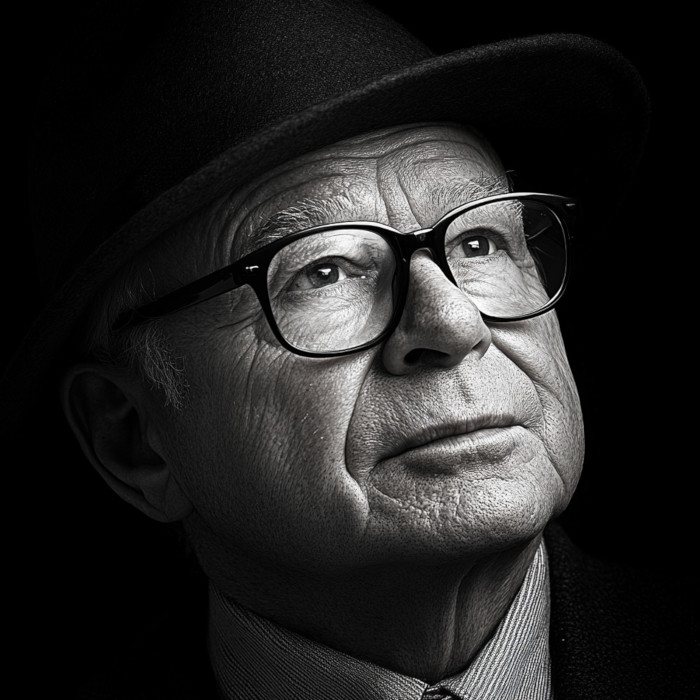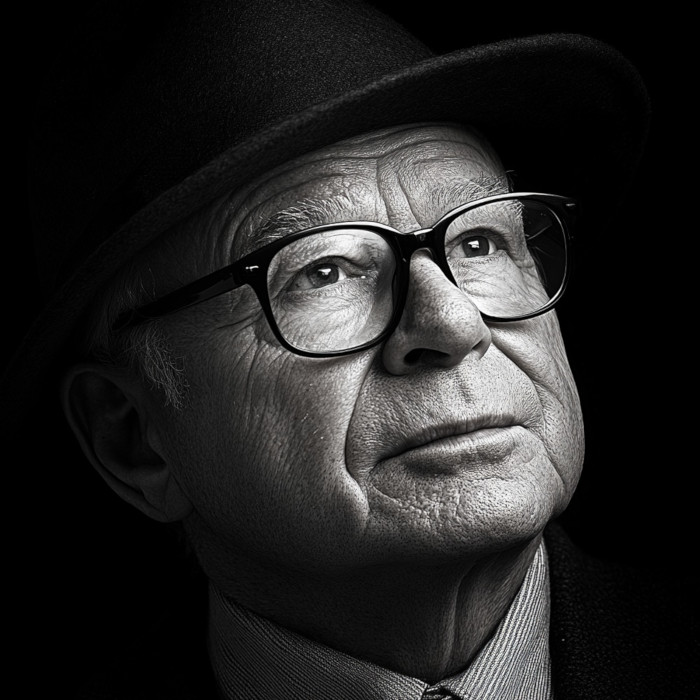


Billy Wilder (1906–2002) was an Austrian-American filmmaker, screenwriter, producer, and director, widely regarded as one of the most influential and versatile figures in the history of cinema. Over a career spanning more than five decades, Wilder created some of Hollywood’s most iconic and enduring films, known for their sharp wit, dark humor, and incisive social commentary. He was a master of multiple genres, including film noir, comedy, drama, and romance, and his work has left an indelible mark on American cinema.
Birth and Early Life: Samuel "Billy" Wilder was born on June 22, 1906, in Sucha Beskidzka, a town in what was then part of the Austro-Hungarian Empire (now in Poland). He was raised in Vienna, Austria, in a Jewish family. Wilder showed an early interest in the arts and initially pursued a career in journalism, working as a reporter in Vienna and Berlin during the 1920s.
Emigration to the United States: As the political situation in Europe deteriorated with the rise of Adolf Hitler and the Nazi regime, Wilder, who was Jewish, fled to Paris in 1933 and then emigrated to the United States in 1934. In Hollywood, he initially struggled to find work but eventually secured a position as a screenwriter, quickly making a name for himself with his sharp, dialogue-driven scripts.
Screenwriting Success: Wilder's early work in Hollywood included writing the screenplays for films like Ninotchka (1939), directed by Ernst Lubitsch and starring Greta Garbo, and Hold Back the Dawn (1941), for which he received his first Academy Award nomination. His collaboration with Charles Brackett, which began in the late 1930s, became one of the most successful screenwriting partnerships in Hollywood, producing a string of hits that combined wit, intelligence, and a deep understanding of character.
Directorial Debut: Wilder made his directorial debut with the film The Major and the Minor (1942), a comedy starring Ginger Rogers and Ray Milland. The film was a commercial success and showcased Wilder's ability to blend humor with subtle social commentary, a characteristic that would define much of his later work.
Double Indemnity (1944): Wilder's film noir masterpiece Double Indemnity is widely regarded as one of the greatest films of the genre. Co-written with Raymond Chandler and based on a novella by James M. Cain, the film tells the story of an insurance salesman (Fred MacMurray) and a femme fatale (Barbara Stanwyck) who plot to murder her husband for insurance money. The film was groundbreaking for its cynical tone, morally ambiguous characters, and innovative use of voice-over narration, all of which became staples of film noir. Double Indemnity earned seven Academy Award nominations, including Best Director for Wilder.
The Lost Weekend (1945): This powerful drama about alcoholism, starring Ray Milland as a writer struggling with addiction, won Wilder his first two Academy Awards for Best Director and Best Picture, as well as an Oscar for Milland as Best Actor. The Lost Weekend was praised for its unflinching portrayal of alcoholism, a subject rarely addressed in Hollywood at the time, and it remains a landmark film in the depiction of addiction and mental health in cinema.
Sunset Boulevard (1950): Widely considered one of the greatest films ever made, Sunset Boulevard is a dark, satirical exploration of Hollywood's golden age and its obsession with fame. The film stars Gloria Swanson as Norma Desmond, a faded silent film star, and William Holden as a struggling screenwriter who becomes entangled in her delusional world. The film's scathing critique of Hollywood, combined with its innovative narrative structure and memorable performances, earned it critical acclaim and 11 Academy Award nominations. Wilder won his second Oscar for Best Screenplay, shared with Charles Brackett and D.M. Marshman Jr.
Ace in the Hole (1951): Also known as The Big Carnival, this film is a biting indictment of media sensationalism and the public's appetite for scandal. Kirk Douglas stars as a cynical reporter who exploits a tragedy for his own gain. Although not initially successful at the box office, Ace in the Hole has since been recognized as a prescient and powerful critique of the media and its impact on society.
Sabrina (1954): A romantic comedy starring Audrey Hepburn, Humphrey Bogart, and William Holden, Sabrina is one of Wilder's lighter films, but it retains his signature wit and sophistication. The film tells the story of a love triangle involving a chauffeur's daughter and two wealthy brothers. Sabrina was a commercial success and further cemented Wilder's reputation as a versatile filmmaker capable of excelling in multiple genres.
Witness for the Prosecution (1957): Based on the play by Agatha Christie, this courtroom drama was another critical and commercial success for Wilder. The film starred Charles Laughton, Marlene Dietrich, and Tyrone Power, and it is renowned for its suspenseful plot, sharp dialogue, and memorable performances. Witness for the Prosecution received six Academy Award nominations.
Some Like It Hot (1959): One of Wilder's most beloved films, Some Like It Hot is a screwball comedy starring Marilyn Monroe, Tony Curtis, and Jack Lemmon. The film tells the story of two musicians who disguise themselves as women to escape the mob, leading to a series of hilarious and chaotic situations. Some Like It Hot is celebrated for its witty dialogue, comedic timing, and its subversive approach to gender roles and sexuality. The film was a major box office success and is often cited as one of the greatest comedies of all time.
The Apartment (1960): Wilder's The Apartment is a bittersweet romantic comedy-drama starring Jack Lemmon and Shirley MacLaine. The film tells the story of an insurance clerk who lends his apartment to company executives for their extramarital affairs, only to fall in love with one of the mistresses. The Apartment won five Academy Awards, including Best Picture, Best Director, and Best Screenplay, making Wilder one of the few filmmakers to win all three in the same year. The film is praised for its blend of humor and pathos, as well as its critique of corporate culture and moral compromise.
Continued Success: Throughout the 1960s and 1970s, Wilder continued to make successful and critically acclaimed films, including Irma la Douce (1963), The Fortune Cookie (1966), and The Front Page (1974). Although his later films did not always achieve the same level of acclaim as his earlier work, Wilder remained a respected and influential figure in Hollywood.
Influence on Cinema: Billy Wilder's influence on cinema is profound and enduring. His mastery of multiple genres, his sharp and often cynical view of human nature, and his ability to balance humor with serious social commentary have inspired generations of filmmakers. Directors such as Martin Scorsese, Woody Allen, and the Coen Brothers have cited Wilder as a major influence on their work.
Awards and Honors: In addition to his multiple Academy Awards, Wilder received numerous honors throughout his career, including the American Film Institute's Life Achievement Award in 1986 and the Directors Guild of America's Lifetime Achievement Award. He was also honored with a star on the Hollywood Walk of Fame.
Personal Life: Wilder was married twice, first to Judith Coppicus, with whom he had two children, and later to Audrey Young, who remained his wife until his death. Wilder was known for his wit, intelligence, and strong opinions, qualities that were reflected in both his work and his personal life.
Death: Billy Wilder passed away on March 27, 2002, at the age of 95 in Beverly Hills, California. His death marked the end of an era in Hollywood, as he was one of the last surviving filmmakers from the golden age of cinema.
Legacy: Billy Wilder's films continue to be studied, celebrated, and enjoyed by audiences around the world. His work is a testament to the power of cinema to entertain, provoke thought, and explore the complexities of the human experience. Wilder's legacy as a master storyteller and one of the greatest filmmakers in history remains secure, and his films continue to inspire and influence the art of filmmaking.
Billy Wilder was a towering figure in the history of cinema, whose body of work spans some of the most iconic and influential films of the 20th century. His ability to navigate different genres, his sharp wit, and his deep understanding of human nature made him one of Hollywood’s most versatile and respected filmmakers. From the dark shadows of film noir to the bright lights of romantic comedy, Wilder's films continue to captivate audiences and remind us of the enduring power of great storytelling.

We use cookies
We use cookies and other tracking technologies to improve your browsing experience on our website, to show you personalized content and targeted ads, to analyze our website traffic, and to understand where our visitors are coming from. Privacy Policy.